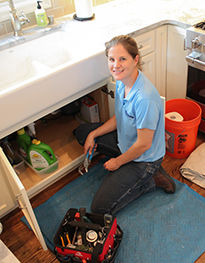An official website of the United States government
 United States Department of Labor
United States Department of Labor
| October 2016
I run a small business that handles residential plumbing remodels and repairs. We do all the basics, from things like routine replacement of a worn or broken fixture (any device connected to a plumbing system that delivers or drains water) to dealing with calls to fix a sink backup over the weekend that can’t wait till Monday. It’s a mix of scheduled and emergency service calls.
There’s no such thing as a “typical” day for me, because no two days are ever the same. I’m a licensed plumber, but I wear a hat for everything so I can fill in wherever I’m needed. That might mean spending a day working on quotes in the office or going on a call that happens outside normal business hours.
I grew up around it because my mom and dad had a plumbing business. As a kid, I’d go along with my dad when he went on calls. He’d be working and would send me out to the truck to get something because I knew where all the tools were. When I was 7 years old, I learned how to solder.
Dad taught me a lot of little things that make a big difference, especially because I’m female—like how to hold a wrench for maximum torque. He was very influential in developing my mechanical aptitude. Early on in my apprenticeship, I realized that I was way ahead of where the typical apprentice was at that point.
My first steady job was working for a local family-owned restaurant. That’s where I learned the importance of having a work ethic: Everyone worked hard; there was no room for being lazy. I also learned a lot about management and dealing with people.
I worked there for 13 years, first in high school and then during college. And when I lived at home and drove the family car to get to work, sometimes the “family car” was Dad’s truck. So I used to help fix the plumbing at the restaurant, since I had all the tools right there in the parking lot.
Not at all. I didn’t have a clear career path. I guess you could say I rebelled against the family business by deciding I didn’t like plumbing and wanted to be a veterinarian. I started college as a biology major, but I hated plants! I ended up studying business.
Then, in my final year of college, I started helping my dad with plumbing jobs again. It was different this time: I had an appreciation for the work and what it was. After a year, I decided to apprentice, and Dad sponsored me in an apprenticeship program.
I was 2 years into my 5-year apprenticeship when Dad decided to retire. I finished my apprenticeship with another plumbing company and started thinking about having my own business. So I went back to school and got my MBA (master of business administration degree).
I would say math is number one, and not only for measuring and calculations: You need the critical thinking that you use in math to work through processes, especially for remodels and planning.
Customer service is so important. We try to provide the extra time and attention it takes to help our customers. And we’re conscientious. Nobody wants a plumber going through the house with muddy shoes or spreading out all over the place, making a mess.
The hands-on, day-to-day service and customer interaction. It’s very satisfying to be out in the field when I’ve fixed a problem and taken the time to explain everything and I know I’ve made a difference for that customer.
I hate putting in water heaters. I don’t mind doing one every once in a while, and I’m not above doing it; I just think it’s boring. It’s so repetitious. Second would be sewer cleanings. But I enjoy everything else.
The biggest surprise was when I stopped working for my dad and went out on my own. For the first time, I realized that being “Tommy’s daughter” gave me credibility. People trusted him, so they trusted me. But on my own, where people didn’t know me, I was nobody’s daughter. I saw the caution in people’s eyes, and it was shocking to me.
It’s also a little surprising that I do use the biology I took in college. I talk a lot about tree roots and sewers to explain how roots will attack joints in the spring and fall. In the spring, when trees are coming out of dormancy, there’s a surge of sewer backups as the roots seek nutrients.
I would truly love to teach someday. My plumbing instructor in my apprenticeship was so influential in helping me learn, and I would like to be that person for somebody else in some capacity.
Find a way to stand out. Show effort that’s above average in everything you do—not just in class, not just at your job, but everything. It will come back to you tenfold. People who don’t go the extra mile get left behind.
I’m very involved talking in high schools, and one thing I tell students is "Embrace your learning style." Maybe you don’t score well in reading, maybe you’re more of a hands-on person. With plumbing, there’s a lot of hands-on problem solving. Poor grades don’t mean you can’t succeed in the trades.
Another thing I emphasize with students is wages. When you apprentice in the trades, you’re getting paid from day one. You’re learning, but you’re also working in a good job that pays well.
Kathleen Green, "Plumber," Career Outlook, U.S. Bureau of Labor Statistics, October 2016.

Jessie Cannizzaro Wauwatosa, Wisconsin Photo by Anne Michalski